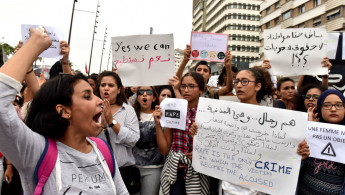What do Moroccan women expect from new reforms in the family code?
Two decades after the first reform of the family code (Moudawana), Moroccan King Mohammed VI ordered a new reform that might end child marriage, inequality in inheritance and other gender-based injustices.
Not all Moroccans remember the significance of the reform of 2004, which, for the first time, guaranteed women the right to file for divorce. Hundreds of Islamists and conservatives went to the streets nationwide in protest against the changes.
However, Moroccan women's activists say today it's time to reform the once-called "most progressive family code in MENA" and guarantee complete equality between men and women, as emphasised by the 2011 constitution.
Moroccan women have three critical demands for changes in the new Moroccan family code that governs areas of family law such as marriage, divorce, inheritance and child custody.
Child marriage
Morocco's 2004 family code raised the minimum age for marriage from 15 to 18. However, it allowed the marriage of females under 18 on the condition that their families obtain permission from a judge. Meanwhile, males are categorically prohibited from marrying before the age of 18.
In 2020, Morocco recorded 12,000 cases of underage marriage. The number rose to 19,000 in 2021, according to Moroccan Justice Minister Abdellatif Ouahbi, who has been lobbying to outlaw the marriage of minors since his appointment two years ago.
The issue gained more attention amid the recent earthquake that struck the country. As the strongest earthquake in almost a century that killed over 2,900, it left many orphan minor girls who became a target of a child marriage campaign launched by conservative men.
After the quake, several NGOs, including Moroccan women's rights NGO Kif Mama Kif Baba, reiterated calls "to penalise anyone involved in child marriage."
Guardianship and child support
According to Chapters 230, 231, 236 and 237 of the current family code, legal guardianship automatically reverts to the father following a separation. In contrast, the mother, who usually takes custody of the children, has no legal rights over them.
"The mother has only the right to take care of them, but she cannot obtain administrative documents such as a passport, travel with them outside the country, or, for example, transfer them from one school. Those rights are solely reserved to the father," said Bushra Abdou, President of the Challenge Association for Equality and Citizenship.
The reserve of guardianship to men is mainly based on the religious text stating the father is the guardian of the family.
Over the years, divorced mothers have voiced their daily distress in facing relentless administrative obstacles while managing their children's studies, bank accounts or identification papers.
"I wanted to open a savings bank account for my kid, but they told me I need his father's signature to save my money for my child. It's mental," Asmae, a divorced mother, told The New Arab.
Also, the amount of money the courts demand for child support is deemed "derisory and disrespectful."
The national average is 400 (US$40) dirhams per month per child. Meanwhile, the housing costs imposed range from 300 to 3,000 dirhams, depending on the father's income, which is difficult to prove if he works in the informal sector or family business.
Inequality in Inheritance and Taasib
"Allah decrees a will for your children; the male gets twice the share of the female" (Surah An-Nisa, 4:11). Interpretations over this single verse continue to hamper Moroccan women's path to equality in inheritance, as both conservative and self-proclaimed liberals say the family code must not contradict explicit religious texts.
Meanwhile, Taasib, a law text inspired by Islamic fiqh, decrees that "female orphans who do not have a brother must share the inheritance with the male relative closest to the deceased … even if unknown and [has] never been part of the family."
Last year, Nabila Bouaayach, head of Morocco's Council of Human Rights (CNDH), said inheritance equality reinforces poverty among Moroccan women and urged immediate reform of the sexist legislation.
Nouzha Skalli, a former minister of women's rights, said in an interview in 2017, "As soon as we said the word inheritance [to clerics], we were accused of blasphemy", about her experience as a member of the Moudawana reform committee in 2004.
This time, the reform committee has no Fuqaha among its members. The committee includes, so far, three law and justice figures in the country, namely the justice minister.
Yet all of them are men, a move widely criticised online, with many arguing it might lead to lukewarm reform that fails to grasp the injustices women face under the current laws. The committee is set to submit the new reform within six months.




 Follow the Middle East's top stories in English at The New Arab on Google News
Follow the Middle East's top stories in English at The New Arab on Google News


![A group of Palestinians, foreign and Israeli activists gather to participated in an olive picking event on the land in the town of Battir, which is under threat of confiscation by Israel in Bethlehem, occupied West Bank on 8 November 2024. [Getty]](/sites/default/files/styles/image_330x185/public/2182930803.jpeg?h=199d8c1f&itok=__0LgGsa)